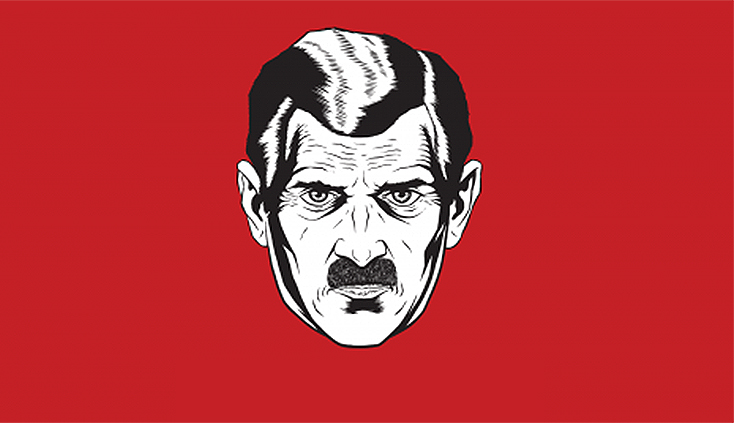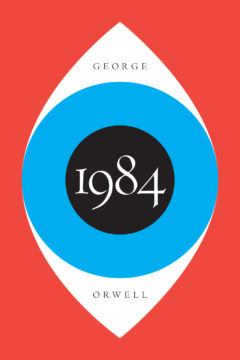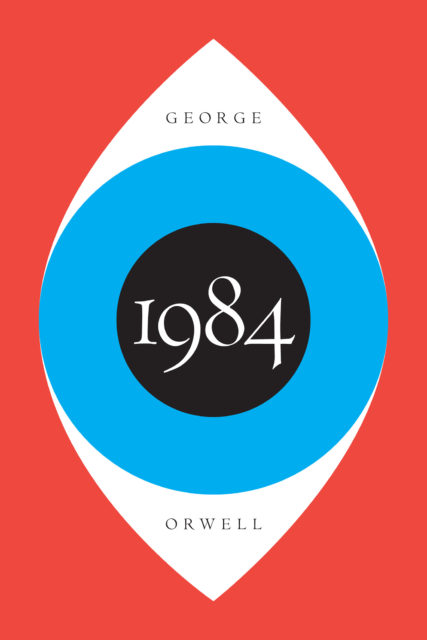
April 4th is the day Winston starts his diary in 1984.
 Like a million other book clubs across the country, mine just (re)read George Orwell’s 1949 dystopian novel, 1984. Its current publisher said sales increased by 10,000 percent after Trump’s inauguration, and it skyrocketed to #1 on Amazon’s bestseller list shortly after his counselor Kellyanne Conway mentioned the administration’s reliance on “alternative facts.” People are returning to the classic for its depiction of a manipulative totalitarian government peddling lies, but they might be sticking with it for the sex.
Like a million other book clubs across the country, mine just (re)read George Orwell’s 1949 dystopian novel, 1984. Its current publisher said sales increased by 10,000 percent after Trump’s inauguration, and it skyrocketed to #1 on Amazon’s bestseller list shortly after his counselor Kellyanne Conway mentioned the administration’s reliance on “alternative facts.” People are returning to the classic for its depiction of a manipulative totalitarian government peddling lies, but they might be sticking with it for the sex.
Yes, 1984 has a lot more sexual themes than you may remember — some of them surprisingly modern; others, not so much.
Written before the sexual revolution and second wave feminism, we can’t be too surprised by lines like “It was Mrs Parsons, the wife of a neighbour on the same floor,” which in one short breath demotes the woman to less-than-neighbor, even though she lives in the same apartment down the hall as her husband. This narrational attitude is not a feature of Orwell’s imagined future, just a reality of the author’s real-world present — a fact which makes other scenes difficult to decipher accurately as purposefully dystopian or just traditionally douchey.
For instance, we learn that one of the government’s aims is to “remove all pleasure from the sexual act,” to “kill the sex instinct, or, if it could not be killed, then to distort it and dirty it”:
It was not merely that the sex instinct created a world of its own which was outside the Party’s control and which therefore had to be destroyed if possible. What was more important was that sexual privation induced hysteria, which was desirable because it could be transformed into war-fever and leader-worship….
“When you make love you’re using up energy; and afterwards you feel happy and don’t give a damn for anything. They can’t bear you to feel like that. They want you to be bursting with energy all the time. All this marching up and down and cheering and waving flags is simply sex gone sour. If you’re happy inside yourself, why should you get excited about Big Brother….?”
So when our protagonist Winston — deprived of loving sex and over-exposed to the orgiastic violence of war his entire life — entertains truly sadistic fantasies about a female coworker named Julia, this may just be evidence of the Party’s success:
Vivid, beautiful hallucinations flashed through his mind. He would flog her to death with a rubber truncheon. He would tie her naked to a stake and shoot her full of arrows like Saint Sebastian. He would ravish her and cut her throat at the moment of climax. Better than before, moreover, he realized why it was that he hated her. He hated her because she was young and pretty and sexless, because he wanted to go to bed with her and would never do so, because round her sweet supple waist, which seemed to ask you to encircle it with your arm, there was only the odious scarlet sash, aggressive symbol of chastity.
But if the Party had truly succeeded, then Winston wouldn’t have had any desire to rail against and resent to begin with. Even if we disregard the disturbing detail of her imagined rape and murder, the above passage still smacks of male entitlement to the female body — not because of but in spite of the Party. Winston hates her because she should be a sexual object but she’s not; he wants to sleep with her but he can’t; her body was practically made for his embrace but he’s not allowed to grab it (the way some modern American presidents do). It seems the problem for Winston here isn’t that the Party promotes rape culture, but that it prevents it. In other words: Winston cannot have what he, as a flesh and blood straight man, is rightfully entitled to. Seventy years later, it’s a misogynistic perspective you can still find on “men’s rights” and “neo-masculinity” sites.
Still, 1984 has shining moments of sexual enlightenment. Much like D.H. Lawrence in his “obscene” 1929 novel Lady Chatterley’s Lover, Orwell elevates positive sexual interactions as a requirement for human happiness, even human dignity. In a passage that could be describing RedTube, he characterizes the pornography churned out by the government and distributed among the lower classes in order to keep them distracted as “ghastly rubbish,” “boring,” relying on just six plots they simply “swap around a bit.” And in his efforts to argue for the sanctity of (at least hetero) sex — of “a man and a woman with no clothes on, making love when they chose, talking of what they chose, not feeling any compulsion to get up, simply lying there and listening to peaceful sounds outside” — Orwell enthusiastically disperses with some sexist stereotypes. While Winston only dreams of having a secret sexual affair, it is his coworker Julia who pursues him and makes all the arrangements for their trysts. She’s proud of her sexuality, unapologetic about her pleasure. And Winston is not offended or put off by her extensive sexual experience — in fact, quite the opposite:
“Have you done this before?”
“Of course. Hundreds of times—well, scores of times, anyway.”
….
“Listen. The more men you’ve had, the more I love you. Do you understand that?”
“Yes, perfectly.”
….
“You like doing this? I don’t mean simply me: I mean the thing in itself?”
“I adore it.”
That was above all what he wanted to hear. Not merely the love of one person but the animal instinct, the simple undifferentiated desire: that was the force that would tear the Party to pieces.
Though initially an inspiring avatar of freedom, Julia — for all intents and purposes the only female character in the book — fails to emerge as Winston’s intellectual and moral equal. He longs for revolution; she doesn’t want to rock the boat. He’s fascinated by the theories behind Party protocol outlined in the Resistance’s book; she literally can’t keep her eyes open as he reads them to her. The lies of history matter to him; she couldn’t care less:
….she only questioned the teachings of the Party when they in some way touched upon her own life.
“I’m not interested in the next generation, dear. I’m interested in us.”
“You’re only a rebel from the waist downwards,” he told her.
She thought this brilliantly witty and flung her arms round him in delight.
One hopes these character flaws of Julia’s are due to her role as Winston’s foil, and not to the perceived inferiorities of her gender — or to her unbridled female sexuality. But while Orwell tries valiantly to be progressive about sex, he sometimes seems mired by his own prejudices about women: how they should look (pretty, painted and curvy), how they should relate to sex (be into it, just not too into it), and how they should be in the world (readily available to men).
In one scene at their secret rendezvous, Julia applies some contraband make-up to her face, much to Winston’s delight:
Her lips were deeply reddened, her cheeks rouged, her nose powdered; there was even a touch of something under the eyes to make them brighter. It was not very skillfully done, but Winston’s standards in such matters were not high. He had never before seen or imagined a woman of the Party with cosmetics on her face. The improvement in her appearance was startling. With just a few dabs of colour in the right places she had become not only very much prettier, but, above all, far more feminine. Her short hair and boyish overalls merely added to the effect….
…”Do you know what I’m going to do next? I’m going to get hold of a real woman’s frock from somewhere and wear it instead of these bloody trousers. I’ll wear silk stockings and high-heeled shoes! In this room I’m going to be a woman, not a Party comrade.”
After the shortages and rationing of World War II, when looking one’s “best” became a patriotic duty for women in a capitalistic society fighting a fascist who apparently hated cosmetics, this scene makes total sense — it reflects a longing for “normalcy” that readers of the time could surely sympathize with. But with the benefit of historical distance, 21st-century readers (at least the ones in my book club) can’t help but see the power of patriarchy running beneath it — a controlling force which limits the things you can say, the places you can go, and the ways you can exist in the world (sound familiar?) if you’re a woman, especially a woman in 1949. Narrow definitions of femininity (and masculinity, for that matter) don’t exactly make for a freer society.
Even after Winston and Julia have been together for a while, enjoying an unorthodox and fairly egalitarian, sexually-driven relationship, his sense of entitlement from earlier in the book doesn’t dissipate — surprisingly, it grows. When she tells him they won’t be able to meet because her period has come early, Winston becomes “violently angry”:
During the month that he had known her the nature of his desire for her had changed. At the beginning there had been little true sensuality in it. Their first love-making had been simply an act of the will. But after the second time it was different. The smell of her hair, the taste of her mouth, the feeling of her skin seemed to have got inside him, or into the air all round him. She had become a physical necessity, something that he not only wanted but felt that he had a right to. When she said that she could not come, he had the feeling that she was cheating him.
Winston is both worshipful and possessive, thanks to his dystopian environment and mid-20th-century sexism.
We can’t expect 1984, written in 1949, to align with the liberal social norms of 2017. But we can certainly appreciate all the elements that made it a book ahead of its time, while being thankful all the assumptions that keep it a product of its time are behind us — well, at least behind those of us who are part of the Resistance.
War Is Hell
Freedom Is Feminism
Ignorance Is Stupid

















